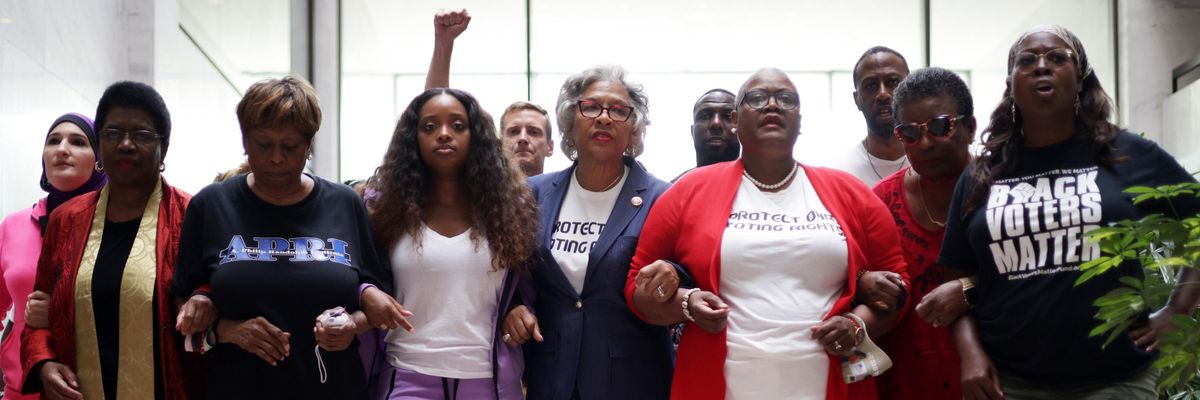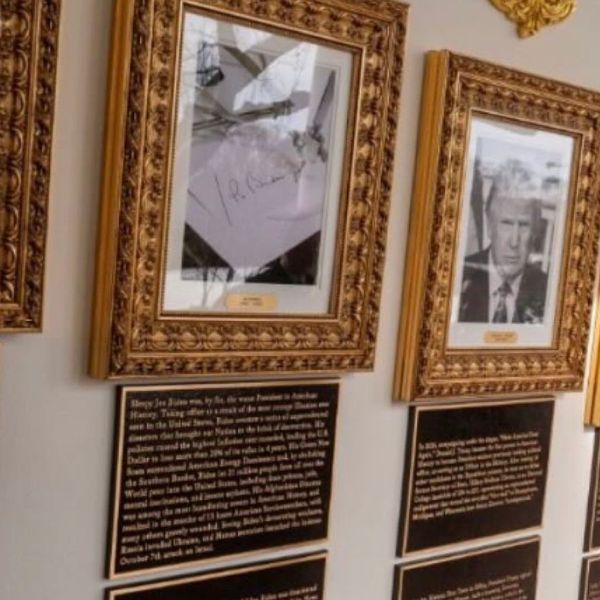
Voting rights activists, led by U.S. Rep. and Congressional Black Caucus chair Joyce Beatty (D-OH), demonstrate at the Hart Senate Office Building on Capitol Hill to protest multiple GOP state and federal efforts to restrict the right to vote. Beatty and eight other black women were later arrested. (Photo: Alex Wong/Getty Images)
Good Trouble: We Have Come Too Far and Fought Too Hard. On Our Watch the Clock Will Not Be Turned Back
This week marks the one-year anniversary of the death of civil rights icon and king of Good Trouble John Lewis, who for over 50 righteous years fought and bled for what he deemed the "soul and heart of the democratic process" - the right to vote. Amidst pernicious attacks on that vital right by state and Congressional Repubs, the week also saw protesters on Capitol Hill leading a still-urgent call to "Let the people vote." For their trouble, nine black women were zip-tied and arrested - like Lewis and so many others, but unlike any of thousands of riotous Jan. 6 domestic terrorists. Weird.
This week marked the one-year anniversary of the death of the civil rights icon, conscience of Congress and king of Good Trouble John Lewis, who over 50 years fought, bled and almost died for what he deemed "the soul and heart of the democratic process" - the right to vote. With state and Congressional Republicans shamelessly working to shred that sacred right - and with gerrymandering, the filibuster and the Supreme Court on their side - civil rights leaders and other sentient beings are struggling to pass the John Lewis Voting Rights Advancement Act, or For the People Act, to protect Lewis' legacy and his core belief in "the most powerful non-violent tool we have in a democracy." Three weeks ago, the Revs. Jesse Jackson and William Barber were arrested during a protest over voting rights and the filibuster; last week Texas Dems fled the state to protect their own constituents' rights as civil rights groups met with Biden to urge him to do more; Friday, black women organizers met with Kamala Harris to do the same. And Thursday, Rep. Joyce Beatty, chair of the Congressional Black Caucus, led a protest at the Hart Senate Office building, where they linked arms, sang "We Shall Overcome" and "This Little Light of Mine, and insisted, still, "Let the people vote." "We have come too far and fought too hard to see everything systematically dismantled (by) those who wish to silence us." Beatty said in a statement, later adding, "This is not a black issue...It's an American issue." For making Good Trouble, she and eight other black women were zip-tied and arrested - like Lewis and many before her, but, she noted, unlike any of the thousands of domestic terrorists who rioted Jan. 6, which was weird.
An Urgent Message From Our Co-Founder
Dear Common Dreams reader, The U.S. is on a fast track to authoritarianism like nothing I've ever seen. Meanwhile, corporate news outlets are utterly capitulating to Trump, twisting their coverage to avoid drawing his ire while lining up to stuff cash in his pockets. That's why I believe that Common Dreams is doing the best and most consequential reporting that we've ever done. Our small but mighty team is a progressive reporting powerhouse, covering the news every day that the corporate media never will. Our mission has always been simple: To inform. To inspire. And to ignite change for the common good. Now here's the key piece that I want all our readers to understand: None of this would be possible without your financial support. That's not just some fundraising cliche. It's the absolute and literal truth. We don't accept corporate advertising and never will. We don't have a paywall because we don't think people should be blocked from critical news based on their ability to pay. Everything we do is funded by the donations of readers like you. Will you donate now to help power the nonprofit, independent reporting of Common Dreams? Thank you for being a vital member of our community. Together, we can keep independent journalism alive when it’s needed most. - Craig Brown, Co-founder |
This week marked the one-year anniversary of the death of the civil rights icon, conscience of Congress and king of Good Trouble John Lewis, who over 50 years fought, bled and almost died for what he deemed "the soul and heart of the democratic process" - the right to vote. With state and Congressional Republicans shamelessly working to shred that sacred right - and with gerrymandering, the filibuster and the Supreme Court on their side - civil rights leaders and other sentient beings are struggling to pass the John Lewis Voting Rights Advancement Act, or For the People Act, to protect Lewis' legacy and his core belief in "the most powerful non-violent tool we have in a democracy." Three weeks ago, the Revs. Jesse Jackson and William Barber were arrested during a protest over voting rights and the filibuster; last week Texas Dems fled the state to protect their own constituents' rights as civil rights groups met with Biden to urge him to do more; Friday, black women organizers met with Kamala Harris to do the same. And Thursday, Rep. Joyce Beatty, chair of the Congressional Black Caucus, led a protest at the Hart Senate Office building, where they linked arms, sang "We Shall Overcome" and "This Little Light of Mine, and insisted, still, "Let the people vote." "We have come too far and fought too hard to see everything systematically dismantled (by) those who wish to silence us." Beatty said in a statement, later adding, "This is not a black issue...It's an American issue." For making Good Trouble, she and eight other black women were zip-tied and arrested - like Lewis and many before her, but, she noted, unlike any of the thousands of domestic terrorists who rioted Jan. 6, which was weird.
This week marked the one-year anniversary of the death of the civil rights icon, conscience of Congress and king of Good Trouble John Lewis, who over 50 years fought, bled and almost died for what he deemed "the soul and heart of the democratic process" - the right to vote. With state and Congressional Republicans shamelessly working to shred that sacred right - and with gerrymandering, the filibuster and the Supreme Court on their side - civil rights leaders and other sentient beings are struggling to pass the John Lewis Voting Rights Advancement Act, or For the People Act, to protect Lewis' legacy and his core belief in "the most powerful non-violent tool we have in a democracy." Three weeks ago, the Revs. Jesse Jackson and William Barber were arrested during a protest over voting rights and the filibuster; last week Texas Dems fled the state to protect their own constituents' rights as civil rights groups met with Biden to urge him to do more; Friday, black women organizers met with Kamala Harris to do the same. And Thursday, Rep. Joyce Beatty, chair of the Congressional Black Caucus, led a protest at the Hart Senate Office building, where they linked arms, sang "We Shall Overcome" and "This Little Light of Mine, and insisted, still, "Let the people vote." "We have come too far and fought too hard to see everything systematically dismantled (by) those who wish to silence us." Beatty said in a statement, later adding, "This is not a black issue...It's an American issue." For making Good Trouble, she and eight other black women were zip-tied and arrested - like Lewis and many before her, but, she noted, unlike any of the thousands of domestic terrorists who rioted Jan. 6, which was weird.
